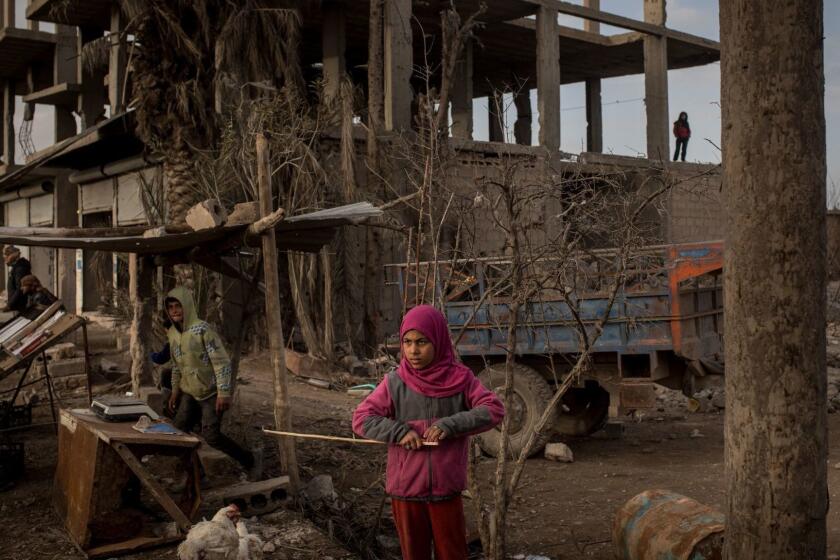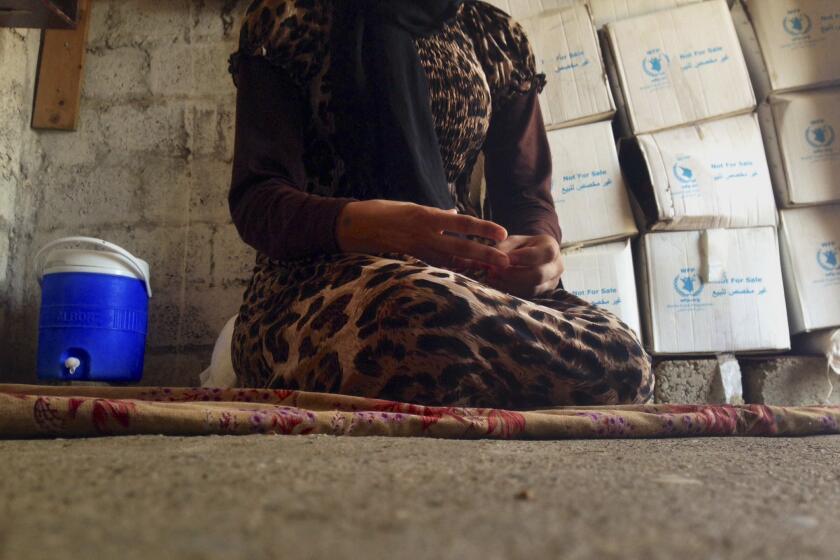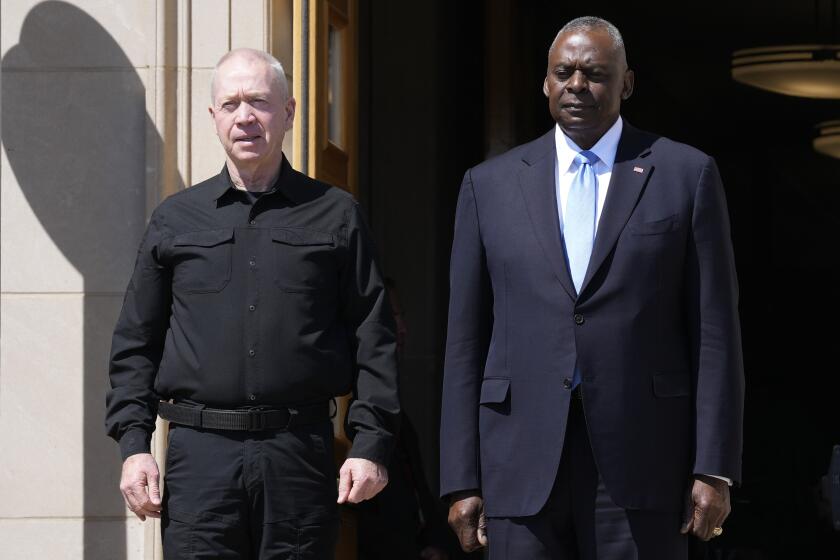A decade after Islamic State declared a caliphate, it’s diminished but still lethal

- Share via
BAGHDAD — A decade after the Islamic State militant group declared its caliphate in large parts of Iraq and Syria, the extremists no longer control any land, have lost many prominent leaders and are mostly out of the world news headlines.
Still, the group continues to recruit members and claim responsibility for deadly attacks around the world, including lethal operations in Iran and Russia this year that left scores dead.
Its sleeper cells in Syria and Iraq still carry out attacks against government forces in both countries as well as U.S.-backed Syrian fighters, at a time when Iraq’s government is negotiating with Washington over a possible withdrawal of U.S. troops.
The group that once attracted tens of thousands of fighters and supporters from around the world to come to Syria and Iraq, and at its peak ruled an area half the size of the United Kingdom was notorious for its brutality. It beheaded civilians, slaughtered 1,700 captured Iraqi soldiers in a short period, and enslaved and raped thousands of women from the Yazidi community, one of Iraq’s oldest religious minorities.
When President Trump spoke recently of Islamic State, he described the group as all but defeated, even in the digital realm.
“Daesh remains a threat to international security,” U.S. Army Maj. Gen. J.B. Vowell, the commanding general of Combined Joint Task Force — Operation Inherent Resolve, said in comments sent to the Associated Press. Daesh is the Arabic acronym for the Islamic State group.
“We maintain our intensity and resolve to combat and destroy any remnants of groups that share Daesh ideology,” Vowell said.
In recent years, the group’s branches have gained strength around the world, mainly in Africa and Afghanistan, but its leadership is believed to be in Syria. The four leaders of the group who have been killed since 2019 were all hunted down in Syria.
Raped, tortured and forced to marry their Islamic State captors, some women and girls from Iraq’s Yazidi religious minority resorted to the only means of escape available: suicide.
In 2013, Abu Bakr Baghdadi, then the leader of the Islamic State in Iraq group, which was formed as an offshoot of Al Qaeda, distanced himself from the Al Qaeda global network and clashed with its branch in Syria, then known as the Nusra Front. The group renamed itself the Islamic State in Iraq and the Levant and launched a military campaign during which it captured large parts of Syria and Iraq.
In early June 2014, the group captured the northern Iraqi city of Mosul, Iraq’s second largest, as the Iraqi army collapsed. Later that month, it opened the border between areas it controlled in Syria and Iraq.
On June 29, 2014, Baghdadi appeared as a black-robed figure to deliver a sermon from the pulpit of Mosul’s Great Mosque of Nuri in which he declared a caliphate and urged Muslims around the world to swear allegiance to it and obey him as its leader. Since then, the group has identified itself as Islamic State.
“Al-Baghdadi’s sermon — an extension of the extremist ideology of Abu Musab al-Zarqawi — continue to inspire ISIS members globally,” said retired U.S. Army officer Myles B. Caggins III, senior nonresident fellow at the New Lines Institute and former spokesman for the Global Coalition to Defeat ISIS. He was referring to Abu Musab al Zarqawi, Al Qaeda’s leader in Iraq who was killed in a U.S. strike in 2006.
Ukrainians displaced by war find new purpose in Shakespeare’s play of love, loss and madness, bringing their blood-red version to the bard’s hometown.
From the self-declared caliphate, the group planned deadly attacks around the world and carried out brutal killings, including the beheading of Western journalists, setting a Jordanian pilot on fire while locked inside a cage days after his fighter jet was shot down, and drowning opponents in pools after locking them in giant metal cages.
A coalition of more than 80 countries, led by the United States, was formed to fight Islamic State and the alliance continues to carry out raids against the militants’ hideouts in Syria and Iraq.
The war against the group officially ended in March 2019, when U.S.-backed and Kurdish-led fighters of the Syrian Democratic Forces, or SDF, captured the eastern Syrian town of Baghouz, which was the last sliver of land the extremists controlled.
U.S., European and Arab mediators press to keep attacks between Israel and Lebanon’s Hezbollah militants from causing an ‘apocalyptic’ Middle East war.
Before the loss of Baghouz, Islamic State was defeated in Iraq in July 2017, when Iraqi forces captured the northern city of Mosul. Three months later, the group was dealt a major blow when SDF captured the northern Syrian city of Raqqa, which was the group’s de-facto capital.
The United Nations says Islamic State still has 5,000 to 7,000 fighters in Syria and Iraq.
Still, at least in Iraq, government and military officials have asserted that the group is too weak to stage a comeback.
“It is not possible for [Islamic State] to claim a caliphate once again. They don’t have the command or control capabilities to do so,” Iraqi army Maj. Gen. Tahseen al Khafaji told the AP at the headquarters of the Joint Special Operations Command in Baghdad, where Iraqi officers and officials from the U.S.-led coalition supervise operations against the extremists.
The command, which was formed to lead operations against the group starting weeks after the caliphate was declared, remains active.
Al Khafaji said Islamic State is now made up of sleeper cells in caves and the desert in remote areas, as Iraqi security forces keep them on the run. During the first five months of the year, he said, Iraqi forces conducted 35 airstrikes against the group and killed 51 of its members.
Also at the headquarters, Sabah al Noman of the Iraqi Counter Terrorism Service said that having lost its hold on Iraq, the militant group is focused mostly on Africa, especially the Sahel region, to try to get a foothold there.
“It is not possible for them to take control of a village, let alone an Iraqi city,” he said. He added that the U.S.-led coalition continues to carry out reconnaissance and surveillance in order to provide Iraqi forces with intelligence, and the security forces “deal with this information directly.”
Although Islamic State appears to be under control in Iraq, it has killed dozens of government forces and SDF fighters over the last several months in Syria.
“Daesh terrorist cells continue in their terrorist operations,” SDF spokesman Siamand Ali said. “They are present on the ground and are working at levels higher than those of previous years.”
Spurred by declining job prospects in the cities and government efforts to lift up rural areas, young people in China are becoming farmers.
In northeast Syria, SDF fighters guard about 10,000 captured Islamic State fighters in around two dozen detention facilities — including 2,000 foreigners whose home countries have refused to repatriate them.
The SDF also oversees about 33,000 family members of suspected Islamic State fighters, mostly women and children in the heavily guarded Al Hol camp.
The worst attack since the group’s defeat occurred in January 2022, when the extremists attacked the Gweiran Prison, or Al Sinaa — a Kurdish-run facility in Syria’s northeast holding thousands of Islamic State militants. The attack led to 10 days of fighting between SDF fighters and the militants that left nearly 500 dead on both sides, before the SDF brought the situation under control.
Caggins said that the U.S.-led coalition’s “military advice and assistance” to Iraq Security Forces, Kurdish Iraqi fighters and the SDF are “essential to maintain dominance against ISIS remnants as well as securing more than 10,000 ISIS detainees at makeshift jails and camps in Syria.”
Abdul-Zahra and Mroue write for the Associated Press. Mroue reported from Beirut.
More to Read
Sign up for Essential California
The most important California stories and recommendations in your inbox every morning.
You may occasionally receive promotional content from the Los Angeles Times.


















